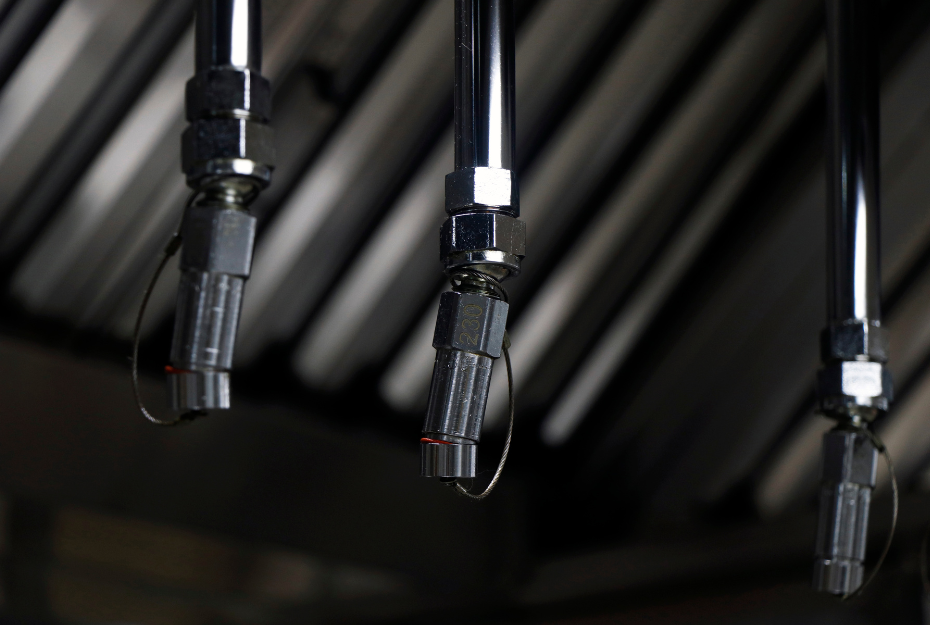
One of the most critical elements to consider in a commercial kitchen is fire safety. Commercial kitchens are high-risk areas due to high heat, open flames, and flammable materials.
Let's break down the legal requirements for fire suppression in exhaust hoods for commercial kitchens in Ontario, ensuring that kitchen operators are equipped with the knowledge needed to protect staff, property, and customers.
What is a Fire Suppression System?
A fire suppression system in a commercial kitchen is designed to automatically detect and extinguish fires, typically in the exhaust hood system where grease and heat can build up. This system uses specialized nozzles to release fire-suppressing chemicals (often wet chemicals) when a fire is detected. These chemicals help prevent the spread of flames and control or put out the fire before it can cause significant damage.
The presence of a fire suppression system is essential in ensuring the safety of any commercial kitchen that operates cooking equipment like deep fryers, grills, stoves, or other appliances prone to fire hazards.

Legal Requirements for Fire Suppression in Ontario
In Ontario, the legal requirement for installing fire suppression systems in commercial kitchen exhaust hoods is governed by several codes and standards, most notably the Ontario Fire Code and NFPA 96 (National Fire Protection Association). Here's a breakdown of when fire suppression systems are legally required:
1. Ontario Fire Code
The Ontario Fire Code (OFC) is the primary legislation that dictates fire safety standards in Ontario. It is enforced by local fire departments and covers a broad range of fire safety practices, including those in commercial kitchens.
According to the Ontario Fire Code, fire suppression systems are required in commercial kitchens where cooking equipment involves the use of open flames or high-temperature grease-laden vapors. This includes appliances like deep fryers, broilers, and woks, which are common in many commercial kitchens.
Specifically, under Section 6.3 of the Ontario Fire Code, kitchen exhaust systems in commercial establishments need to be equipped with a fire suppression system if:
- Grease-laden vapors are generated during cooking.
- The kitchen utilizes cooking equipment that creates a high fire risk, such as deep fryers, griddles, or ranges.
- There is a high volume of cooking (for instance, in a very busy restaurant).
2. NFPA 96 - Standard for Ventilation Control and Fire Protection of Commercial Cooking Operations
In addition to the Ontario Fire Code, the NFPA 96 standard outlines more specific criteria for the installation of fire suppression systems in commercial kitchens. This standard is widely adopted across North America and is referenced by the Ontario Fire Code.
According to NFPA 96, a fire suppression system is required in commercial kitchen exhaust systems in the following cases which are the same/similar to above:
- When the cooking equipment uses open flames or generates grease-laden vapors (deep fryers, woks, charbroilers, etc.).
- If the exhaust hood system is above certain cooking appliances, particularly those that operate at high temperatures or produce high levels of smoke or grease.
- If the cooking operation is in a high-volume commercial kitchen, where the risk of fire is higher due to constant cooking.
NFPA 96 also specifies that fire suppression systems must be regularly tested and maintained to ensure they are functional when needed. Additionally, the system must be able to activate automatically when a fire is detected and provide sufficient coverage for all the areas of the kitchen that are at risk.
Regular Inspections and Maintenance
It’s important to note that, once installed, fire suppression systems must undergo regular maintenance and inspections to remain compliant with fire safety regulations. The Ontario Fire Code and NFPA 96 require that fire suppression systems be serviced every six months to ensure they are functioning properly. Inspections and testing should be conducted by licensed professionals who are qualified to handle and maintain the equipment.
Stay safe, stay compliant! Contact our team for any further questions or quotes.
